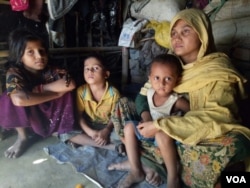A recent report issued by the office of the United Nations High Commissioner for Human Rights chronicles killings, gang rapes, beatings, disappearances, and other crimes and acts of cruelty against ethnic Rohingya Muslims at the hands of Myanmar’s security forces.
Malaysian Prime Minister Rajib Nazak said, “Enough is enough,” and sent an aid flotilla to assist the Rohingya community, but the vessel was met by protests.
Pope Francis said, “They have been suffering for years, they have been tortured, killed simply because they wanted to live their culture and their Muslim faith.”
What, however, will it take to resolve the abuses outlined in the report?
Five analysts shared their opinions with VOA.
Jonah Blank, senior political scientist at the RAND Corporation
“At the most basic level, the governments of both Myanmar and Bangladesh must grant access to international relief workers and journalists - by Myanmar to the Rohingya population in Rakhine State, and by Bangladesh to the refugees being housed in barely-inhabitable camps. At a deeper level, however, the greatest burden rests with Myanmar: to end the abuses documented by the U.N. and other observers; the government in Yangon must uphold the basic human rights and civil rights of its Rohingya citizens."
Hunter Marston, Myanmar analyst
“First of all, it would take the establishment of genuine law and order on the ground in Rakhine State, where the abuses are taking place. Thus far, the Myanmar police force, which is loyal to the military by way of the Ministry of Home Affairs, has been unable to play the role of neutral arbiter. There have been frequent allegations of police non-intervention or active collusion in violence enacted upon the Rohingya. So it will take an active restructuring of the MPF (Myanmar Police Force) to find an effective solution, in addition to further training in peacekeeping, empathy, and religious tolerance, among other areas. Beyond that, the Myanmar government must allow more access to humanitarian aid groups and the media. Only the free flow of information, unhampered by security forces and the NLD (National League for Democracy party) government, can accurately report the facts on the ground, which will lead to effective policy making.”
Greg Poling, director of the Asia Maritime Transparency Initiative
“Bottom line, there is no way the situation of the Rohingya improves unless the political leadership in Myanmar, meaning especially Aung San Suu Kyi, chooses to really grapple with the issue, roll back state-sanctioned discriminatory policies and pressure the military to change its approach. The Rohingya have been systematically disenfranchised and demonized by successive governments since the 1960's. Now even liberal members of society, including many senior officials within the NLD government, see them as not only not citizens, but undeserving of any basic human rights. Perhaps Aung San Suu Kyi doesn't agree with that sentiment, but she has also been unwilling to say a word in defense of the Rohingya. In effect, they are being sacrificed so she and her government can focus on the lot of ethnic Burmans and more powerful and more widely accepted ethnic minorities. As long as that's the case, things cannot improve.”
Evan Rees, Stratfor Southeast Asia analyst
"The Rohingya problem is rooted in deep ethnic and religious issues. The Rohingya want recognition as an official ethnic minority and as citizens of Myanmar. Their ethnic neighbors - the Buddhist Rakhine - see this as a threat to their own status. At the same time, influential Buddhist populists with heavy influence in the rest of the country - and within the military - present Islam as a threat to the nation. That means that local ethnic minorities, Buddhist political activists and the military are all aligned against the Rohingya. The military’s solution to this issue is to crack down as it has done in other ethnic borderlands like Karen and Kachin State. Aung San Suu Kyi has been silent because she herself has little control over the military and risks popular backlash from Buddhist populists. Any resolution to the abuses in the Rohingya areas will require a resolution of Myanmar’s longstanding civilian-military divide and a political will to compromise on wide ethnic and religious divisions. Aung San Suu Kyi's party is still on the razor's edge and, from this precarious position, has little chance of resolving these issues."
Phil Robertson, Asia division deputy director of Human Rights Watch
"The grievous rights abuses uncovered by OHCHR can only be adequately responded to by an independent, international investigation commissioned by the U.N. Human Rights Council when it meets next month. The Burma government had its chance and has only shown interest in whitewashing its security forces' use of rape, extrajudicial executions, and arson to destroy entire Rohingya communities."
Regional responses
In a closed door meeting of officials and international agencies in Dhaka, Bangladesh this week, the group said Myanmar’s government remains “in denial” about alleged atrocities carried out by its military against minority Rohingya Muslims. The U.N. high commissioner for human rights said Myanmar leader Aung Sang Suu Kyi was moved by its report; however, she doesn’t have constitutional control of the security forces.
On Thursday, however, Myanmar’s Foreign Affairs Ministry said authorities will conduct an investigation into alleged atrocities in the Rakhine State. The ministry’s director-general, Aye Aye Soe, told Radio Free Asia, “We’ll have to find out how truthful the allegations are.”
While visiting Singapore, Indonesia’s foreign minister, Retno Marsudi said, “I would like to once again reiterate the importance for the government of Myanmar to take significant steps to create an enabling environment for peace and reconciliation to take place," warning the crackdown could create instability in Southeast Asia.







